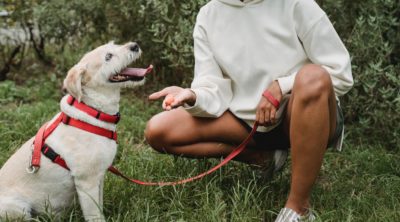Help your dog succeed.
So often, I train people and their dogs and am always perplexed when people think their dog should know so much more than they do without anyone ever teaching them. It’s odd and flawed thinking. As if puppies are born knowing to come when called and not move when someone asks them to stay. I see it all of the time. “He won’t listen, he never comes when I call him, he doesn’t stay if I walk away from him”. It seem so logical to me that, of course they don’t do these things! You haven’t taught him to yet.
Your baby puppy knows nothing about how to live in your world.
And neither does the new to you adult dog that you just adopted. You need to help them along and show them what your rules are and want you expect of them. They don’t know they can’t pee or poop in the living room. How could they? And you get angry if they do. This unfortunately, isn’t setting your new pup up for success. Be proactive and think about everything you would like or need them to do and teach them how. It’s like moving to another country where you don’t know the customs or speak the language. There you are in your new world and you sit on the sofa at your new housemates place, thinking this would be perfectly fine and comfy, and he yells at you, “NO!” and slaps you in the face. What the heck just happened??! You just saw him sit there, why can’t you? 
What do your want your new pup to do?
Make a list of what things are important to you. There is, of course, potty training. Your new dog may not yet know the proper place to potty so you have to help him out and teach him. Then there is not jumping on people, staying off of the furniture, walking nicely on the leash, etc. They have no way of knowing that you even want them to do these things , much less how to do them! Get your self a good, force free trainer tho help at home or take them to a positive reinforcement class. But remember-even if you get a trainer or take them to class, it is on you to train your dog. It is the human’s responsibility to make sure they know what is expected of them. Not the dog’s.
Teach them well.
Teach them everything they need and make sure you go further than the 4 to 6 week class that you take. These classes give you tools to use to maintain the behaviors that your dog has learned and you’ll want to continue with them. If you stop the training after the class, the behaviors may go away. It’s like learning a new language. If you don’t practice it and use it on a regular basis, you might lose it. Keep going with more training. Dogs love to learn and have a huge capacity for learning.
Make training doable for both of you.
Don’t stress that you have to spend hours at a time training your dog. I advise making it easy on both of you, otherwise it becomes a daunting task. And we know what often happens when things become daunting. You put it off and don’t do it. 
So, do short training sessions. Get 10 treats out at a time and just do 10 repetitions of one behavior. Later in the day, do ten repetitions of another behavior. Incorporate training into every day. Keep treats in your pockets. Any time you have a minute,
do a short training session. If your pup is across the room, ask him to Come and when he gets to you, give him a treat.
Training is about repetition and creating habits. Habits that you want your dog to have. He will create his own habits, maybe ones you don’t want, if you don’t show him the way.


